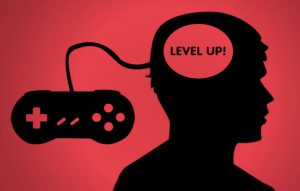"The game of Chess is not merely an idle amusement. Several very valuable qualities of the mind, useful in the course of human life, are to be acquired or strengthened by it, so as to become habits, ready on all occasions . . . we learn by Chess the habit of not being discouraged by present bad appearances in the state of our affairs, the habit of hoping for a favourable change, and that of persevering in the search of resources." —Benjamin Franklin, “The Morals of Chess”In my previous post on video games as therapy, I highlighted a few ways that people can engage with video games to improve symptoms related to a variety of medical conditions and circumstances. In this post, I explore some of the psychological benefits gamers can glean from this technology.
 Benjamin Franklin’s words in his chess essay (chessay?) speak to some of the greatest positive outcomes that researchers have identified in gamers. Perhaps the most cited positive outcome is a gamer’s persistence in overcoming challenges, hoping beyond hope that they will succeed in their task. Researchers identify two different theories of abilities: entity theory and incremental theory. While entity theory arises from having our natural traits highlighted (hearing “You are so smart!” after doing well on an exam), incremental theory occurs from having our efforts highlighted (hearing “you studied hard for that test!”). If our efforts are highlighted rather than natural traits, researchers indicate that we will be more motivated to put in practice to improve our performance in tasks (Granic, Lobel, & Engels, 2014).
Game developers foster incremental motivation by balancing game difficulty to players’ ability levels and providing immediate task feedback. Players always have access to the resources they need to overcome the task at hand; the challenge rests in discovering how to best use these resources to seek victory. To use World of Warcraft as an example, this phenomenon could look like a group of 10 people (a raid group) fighting a boss who is almost too powerful to be defeated. However, if the party communicates effectively in timing their spells and cooperates in avoiding the boss’s attacks, then they can achieve a hard-fought victory.
Benjamin Franklin’s words in his chess essay (chessay?) speak to some of the greatest positive outcomes that researchers have identified in gamers. Perhaps the most cited positive outcome is a gamer’s persistence in overcoming challenges, hoping beyond hope that they will succeed in their task. Researchers identify two different theories of abilities: entity theory and incremental theory. While entity theory arises from having our natural traits highlighted (hearing “You are so smart!” after doing well on an exam), incremental theory occurs from having our efforts highlighted (hearing “you studied hard for that test!”). If our efforts are highlighted rather than natural traits, researchers indicate that we will be more motivated to put in practice to improve our performance in tasks (Granic, Lobel, & Engels, 2014).
Game developers foster incremental motivation by balancing game difficulty to players’ ability levels and providing immediate task feedback. Players always have access to the resources they need to overcome the task at hand; the challenge rests in discovering how to best use these resources to seek victory. To use World of Warcraft as an example, this phenomenon could look like a group of 10 people (a raid group) fighting a boss who is almost too powerful to be defeated. However, if the party communicates effectively in timing their spells and cooperates in avoiding the boss’s attacks, then they can achieve a hard-fought victory.

Some of World of Warcraft’s raid bosses included for context. Through the power of gaming, defeating fearsome undead dragons and flesh behemoths is within our grasp. (image obtained from WoW Wiki)



Leave a Reply